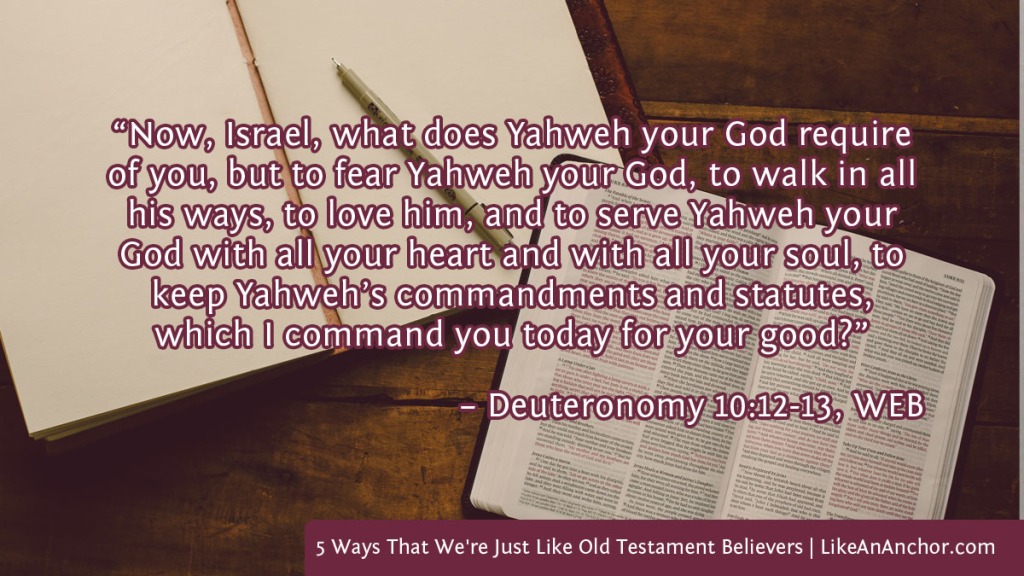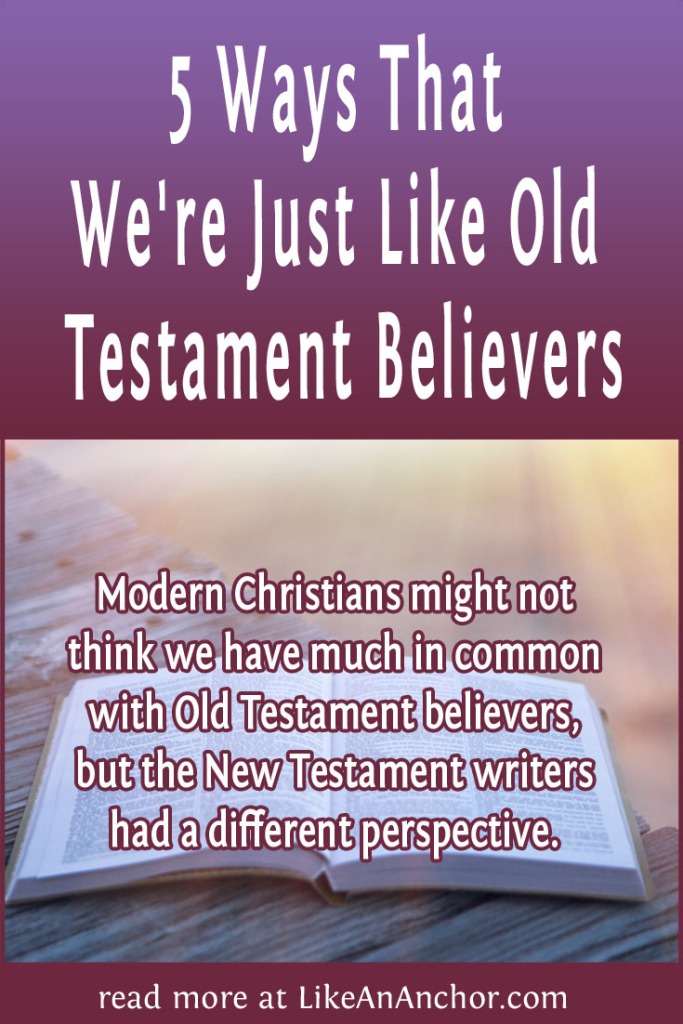A lot of times, I think we assume that Christianity is a New Testament religion and the Old Testament (OT) is just history or a book that the Jewish people use as their religious text. But if you read a translation of the New Testament (NT) like the New English Translation (NET) that highlights the times when Jesus and the NT writers quote the OT, you’ll see that the believers writing the NT were deeply connected to the OT.
When Jesus died and rose again, He didn’t invent a new religion and name it “Christianity.” He was there as the next step in God’s plan that stretches from Genesis to Revelation and beyond. Our faith is a continuation of what came before. Because of that, we have much more in common with Old Testament believers than we might initially assume. For one thing, we serve the same God. There are some major differences between the Old and New Testaments, but those differences have to do with updates and changes that God made to His relationship with people (and which He prophesied in the OT). God didn’t change, and His basic expectations for people as well as His preferred type of relationship with us didn’t change either.
1) We Are In Covenant With God
If you want to understand how God relates to human beings, you have to study covenants. That’s the structure that God uses for His relationships with people in the Old and New Testaments. They are binding agreements with expectations for both parties. Those expectations–the terms of the relationship agreement, if you will–are established by God. We get to decide if we agree to enter the covenant with Him or not, but we don’t get the option to change how the covenant works.
There are multiple covenants in the OT, but the ones we discuss most often are the Abrahamic Covenant and the Sinai Covenant. The “Old Covenant” usually refers to the Sinai Covenant. The laws given alongside that covenant are part of that covenant agreement, but in many cases also pre-date it (e.g. Noah knew about clean and unclean meats and how to build an altar to Yahweh [Gen. 7:2; 8:20]; Abraham and Jacob knew about tithing [Gen. 14:19-20; 28:20-22]; Joseph knew sleeping with Potiphar’s wife was a sin against God [Gen. 39:7-9]).
Just like us today, Old Testament believers were in covenant with God. Some were in multiple covenants (David, for example, was under the Old Covenant and he received a kingship covenant we call the Davidic Covenant). They couldn’t perfectly keep the covenants, though. God always holds up His side of covenants perfectly, but human beings aren’t that reliable and He knows it. That’s why He promised the Messiah would come, end the Old Covenant, die to free everyone from their sins by taking the penalty for them on Himself, and establish a New Covenant (Jer. 31:31-34; Heb. 8). We’re part of that New Covenant, which was one of the promises contained in the Old Covenant.
2) We Fall Short of God’s Standards
Like Old Covenant believers, the covenant agreement we’ve made with God includes expectations for our behavior and the way we properly relate to Him (Rom. 6; Gal. 5). But we’re human, and we all fall short of God’s perfect standards. The only human being who ever perfectly kept covenant with God is Jesus Christ. We might look back at ancient Israel’s example and think we’d never be as unfaithful and ungrateful as them, but NT writers have some stern warnings against such an assumption.
For I do not want you to be unaware, brothers and sisters, that our fathers … were all drinking from the spiritual rock that followed them, and the rock was Christ. But God was not pleased with most of them, for they were cut down in the wilderness. These things happened as examples for us, so that we will not crave evil things as they did. … These things happened to them as examples and were written for our instruction, on whom the ends of the ages have come. So let the one who thinks he is standing be careful that he does not fall.
1 Corinthians 10:1, 4-6, 11-12, NET
By and large, Old Covenant believers didn’t have the holy spirit or a personal relationship with God like we do (though there were exceptions, like David). But they weren’t unaware of God’s law or the covenant agreement they made. Two NT writers even go so far as to say they had the gospel preached to them just like we did (Heb. 4:1-2; 1 Pet. 4:5-6). Yet they still fell short. We have the same human tendencies, and we need to be on guard against making the same mistakes. And when we do sin (“miss the mark,” in Hebrew), we need to repent and ask for forgiveness.
3) Our Sins Are Purified by Blood
In the Old Covenant, God’s law commanded blood sacrifices of animals to atone for sins. God had very specific requirements for these sacrifices, and they needed to be repeated every time someone became aware of their own sin (see, for example, Leviticus 4:22-35). There was also a yearly sacrifice offered by the high priest on the Day of Atonement (Yom Kippur) to cleanse the people. God promised that if they did these things as commanded, “You shall be clean from all your sins before Yahweh” (Lev. 16:30, WEB).
The writer of Hebrews tells us that those sacrifices were not actually capable of perfecting the people worshiping God in the OT (Heb. 9:9; 10:1). In fact, “it is impossible for the blood of bulls and goats to take away sins” (Heb. 10:4, WEB). That does not mean God was lying when He told OT believers that He would forgive them. It means their forgiveness depended on something other than the animal sacrifices. Some of the OT believers even knew that; David wrote that sacrifices weren’t what God really desired (Ps. 40:6; 51:16-17) and Job knew that the Lord was his redeemer, not sacrificial offerings (Job 19:25-26).
For if the blood of goats and bulls and the ashes of a young cow sprinkled on those who are defiled consecrated them and provided ritual purity, how much more will the blood of Christ, who through the eternal Spirit offered himself without blemish to God, purify our consciences from dead works to worship the living God.
And so he is the mediator of a new covenant, so that those who are called may receive the eternal inheritance he has promised, since he died to set them free from the violations committed under the first covenant.
Hebrews 9:13-15, NET
The NT writers often treat us New Covenant believers as if we were once under the Old Covenant and are now free from it to live under the New Covenant. Paul in particular often talks about us previously living under that Old Covenant law even when he’s writing to Gentiles. He’s including us in the story of the plan of God, like we personally participate in the narrative of making a covenant with God, breaking it, needing redemption, being freed from sin by Christ, and entering a New Covenant with Him (e.g. Rom. 7:1-6). This connects us with the whole plan of God, and indicates that those who died in faith before Christ’s sacrifice are also set “free from the violations committed under the first covenant” by His redemptive work even though it happened after they’d lived and died.
But when this priest had offered one sacrifice for sins for all time, he sat down at the right hand of God, where he is now waiting until his enemies are made a footstool for his feet. For by one offering he has perfected for all time those who are made holy.
Hebrews 10:12-14, NET (italics mark allusion to Ps 110:1)
In Greek, “for all time” is translated from the phrase eis to dianekes. Eis (G1519) is a preposition meaning “into, unto, to, towards, for, among” (Thayer). To is the definite article (i.e. “the,” not always translated because Greek uses it more often than English). Dianekes (G1336) is an adjective meaning “continuously, continuous” (Thayer). The phrase only appears in Hebrews 10:12, 14 and it highlights that Jesus’s sacrifice is “continual, perpetual, protracted” (Zodhiates). Most certainly it covers from Jesus sacrifice onward into the future, but His sacrifice also covered those in the past to whom God had promised forgiveness.
4) We’re Called Out to be Different
We’re likely familiar with the New Testament instruction that Christians should be different from the world around us. We’re supposed to stand out like lights in a world of darkness (Matt. 5:13-16; Phil. 2:15). We’ve been chosen by God to belong to Him, to be different from the world, and to be visible examples of His way of life.
But you are a chosen race, a royal priesthood, a holy nation, a people of his own, so that you may proclaim the virtues of the one who called you out of darkness into his marvelous light. You once were not a people, but now you are God’s people. You were shown no mercy, but now you have received mercy.
1 Peter 2:9-10, NET
The NET Bible marks allusions to OT passages with italics and direct quotes with bold italics. Here, Peter uses “various allusions and quotations from Exod 19:5-6; 23:22 (LXX); Isa 43:20-21; and Mal 3:17” and quotes “from Hos 1:6, 9; 2:23” (NET footnotes). He’s making the point that New Covenant believers are called out as God’s special people who belong to Him, and he’s doing that using Old Testament passages like this one:
For you are a holy people to Yahweh your God. Yahweh your God has chosen you to be a people for his own possession, above all peoples who are on the face of the earth.
Deuteronomy 7:6, WEB
In addition to being chosen as God’s own special people, OT believers were also intended to shine as lights in the world. The OT just uses different phrasing to make that point.
Behold, I have taught you statutes and ordinances, even as Yahweh my God commanded me, that you should do so in the middle of the land where you go in to possess it. Keep therefore and do them; for this is your wisdom and your understanding in the sight of the peoples who shall hear all these statutes and say, “Surely this great nation is a wise and understanding people.” For what great nation is there that has a god so near to them as Yahweh our God is whenever we call on him? What great nation is there that has statutes and ordinances so righteous as all this law which I set before you today?
Deuteronomy 4:5-8, WEB
People were supposed to be able to look at ancient Israel living in covenant with God and marvel at their wisdom, understanding, and greatness. We see this happening only very occasionally in Israel’s history (the reign of Solomon is the only example I can think of [1 Kings 4:34]). God’s not giving up on this goal, though (Isa. 62:1-2). People should be able to recognize us as God’s people. Jesus specifically says they’ll know we’re His disciples by the love we have for each other, and Paul says the same thing can happen when someone witnesses us prophesying in church (John 13:34-35; 1 Cor. 14:24-25).
5) The Greatest Thing We Can Do
God’s expectation and purpose for us haven’t changed that much since the time of His very first interactions with human beings. Jesus highlights this by pointing back to the Old Covenant when someone asked Him about the greatest commandment.
Now one of the experts in the law came and heard them debating. When he saw that Jesus answered them well, he asked him, “Which commandment is the most important of all?” Jesus answered, “The most important is: ‘Listen, Israel, the Lord our God, the Lord is one. Love the Lord your God with all your heart, with all your soul, with all your mind, and with all your strength.’ The second is: ‘Love your neighbor as yourself.’ There is no other commandment greater than these.”
The expert in the law said to him, “That is true, Teacher; you are right to say that he is one, and there is no one else besides him. And to love him with all your heart, with all your mind, and with all your strength and to love your neighbor as yourself is more important than all burnt offerings and sacrifices.” When Jesus saw that he had answered thoughtfully, he said to him, “You are not far from the kingdom of God.” Then no one dared any longer to question him.
Mark 12:28-34, NET
The NET footnotes on these verses say they’re quoting Deuteronomy 4:35; 6:4-5; Leviticus 19:18, and Joshua 22:5. Because the expert in the law properly understood these commands from the Old Testament, Jesus told him he wasn’t “far from the kingdom of God.” That kingdom is what we’re striving toward as NT believers. We might not think that looking back to God’s commands from the Old Testament would help with that, but Jesus says that they do.
In the Old Testament and the New, God wants a relationship with human beings. Since the very beginning, He’s been working with groups of people that He chose and called out from the world. He welcomes them into covenant with Him, makes provision for when they fall short of His expectations, purifies them from their sins through sacrifice, and asks them to follow Him with their whole hearts. Many of the things that He asks of us today are the same things He wanted in His relationships with people in the Old Testament. Indeed, one of the reasons for the change of covenant was so that He could get closer to achieving that relationship (Eze. 11:17-20; 36:22-28; Jer. 31:31-34; 2 Cor. 6:16-18). Now, just as back then, He wants to be our God and He wants us to be His people, His sons and daughters.
Featured image by Dakota from Lightstock
Song Recommendation: “Am Echad (One People)” by Ted Pearce





